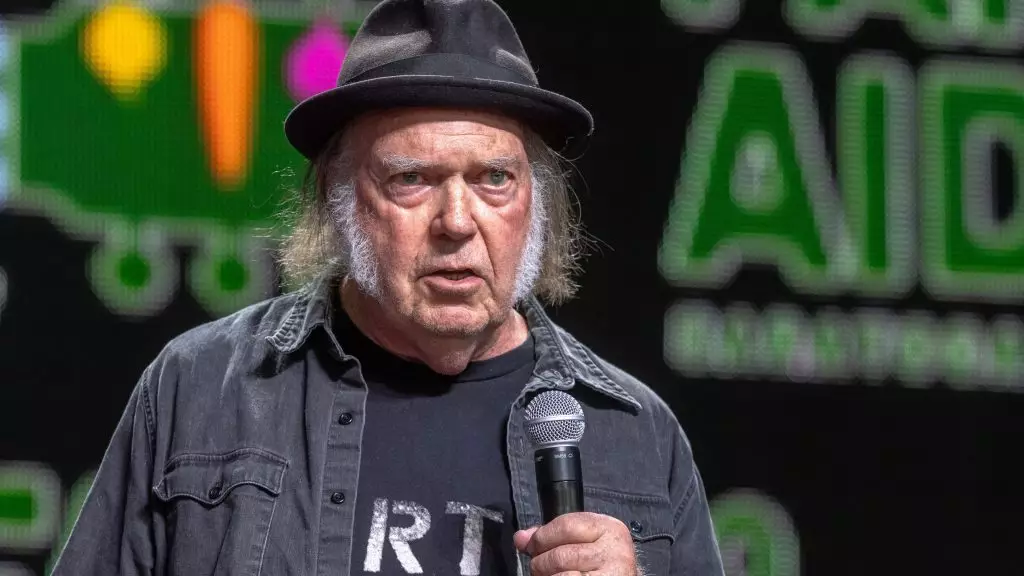In a surprising twist that reflects both the complexities of artist-festival relationships and the power of communication, Neil Young has decided to perform at the iconic Glastonbury Festival this June after initially declaring he would not attend. This change of heart comes just hours after Young publicly voiced his concerns about the festival’s alleged corporate treatment, especially regarding its partnership with the BBC. His journey from reluctance to eagerness is illustrative of the often tumultuous dynamics within the music industry, where the voices of artists and organizers can become muddied by misunderstandings.
Young, the legendary musician known for his haunting melodies and social activism, initially took a stand against Glastonbury, stating that the festival was no longer the grassroots celebration of music and culture it once was. Perplexed by what he perceived as corporate overtures, he expressed disappointment in a heartfelt letter to fans, lamenting a change he believed was in direct conflict with his artistic values. However, shortly after these declarations, he clarified that he had received incorrect information, leading to his renewed enthusiasm for performing.
What drove Young to initially withdraw from the festival? The crux of his frustration seemed to hinge on his feelings about corporate influence in music—a sentiment that resonates deeply with many artists who fear losing the soul of their craft to commercialization. Young voiced his discontent by emphasizing that the relationship between Glastonbury and the BBC has shifted since the last time he graced the stage. The musician recalled with fondness the days when the festival felt free from corporate strings, a perfect environment for the kind of artistic expression he champions. This sentiment is not new; artists have long wrestled with balancing commercial partnerships and the artistic integrity that brought them to the stage in the first place.
The BBC has been a partner of Glastonbury since 1997, which raises questions about how such collaborations can be perceived differently by artists over time. While many see the influx of corporate sponsorship as a necessary evil to sustain large-scale events, others, like Young, view these changes through a lens of authenticity and artistic freedom that seems increasingly elusive in today’s music landscape.
Young’s experience serves as a powerful reminder of the importance of communication in the realms of art and music. His shift in decision reflects not only the impact of personal understanding but also the need for clear and open dialogue among stakeholders in any artistic endeavor. In this case, a misunderstanding led to a potential loss for both the artist and the festival—a stark example of how miscommunication can threaten the very fabric of artistic collaboration.
The Glastonbury organizers, who expressed their joy at Young’s return, highlighted their love for the artist’s uncompromising approach to music. Emily Eavis, one of the festival founders, publicly welcomed him back, underlining the strong connection that exists between the festival and its performers. This suggests that while corporate relationships might complicate things, the intrinsic love for music, artistry, and live performance remains a unifying force.
Moreover, Young’s story also underscores a broader narrative regarding artists’ roles in society. His past actions, such as removing his songs from Spotify due to concerns about misinformation, indicate a steadfast dedication to his beliefs—an admirable yet sometimes isolating stance. The fact that Young managed to navigate the corporate landscape to ultimately reaffirm his commitment to performing further cements his status as a principled figure in the music world.
As we anticipate Young’s performance at Glastonbury, it is essential to reflect not only on the personal choices made by artists like him but also on what those choices mean in the context of a rapidly changing music industry. The intersection of corporate partnerships and artistic purity continues to be a contentious topic, making Young’s evolution an ongoing saga worth contemplating as the festival approaches. His journey certainly invites fans to ponder the complexities that lie beneath the surface of their beloved events and the artists they admire.
In essence, Neil Young’s brief foray into cancellation has become a poignant commentary on artistry, authenticity, and the sometimes challenging paths that lead us back to what truly matters: the music.

